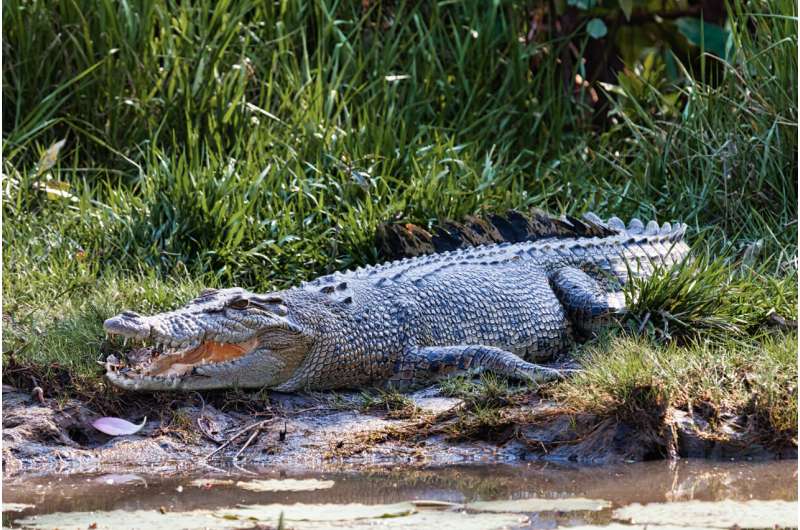This article has been reviewed according to Science X's editorial process and policies. Editors have highlighted the following attributes while ensuring the content's credibility:
fact-checked
trusted source
proofread
Vaccine developed to protect crocodiles and multi-million dollar industry

A University-of-Queensland-developed vaccine may protect farmed saltwater crocodiles from West Nile virus (WNV), providing economic and biodiversity benefits to northern Australia.
Dr. Jody Hobson-Peters from UQ's School of Chemistry and Molecular Biosciences said the virus, which is prevalent in high rainfall years, threatens the commercial viability of the $100million a year crocodile hide farming industry.
"Crocs infected with the local strain of WNV, known as Kunjin virus, develop small skin lesions called pix, which renders their hide unsaleable," Dr. Hobson-Peters said.
"WNV infection can affect up to 30% of croc hides, costing the industry as much as $10million in a single year.
"If we were to experience consecutive years of high rainfall, the virus could render the crocodile farming industry unviable and threaten the current conservation model.
"It would also disrupt an industry that contributes to Indigenous livelihoods and economic development opportunities in the Northern Territory and Far North Queensland."
UQ's Professor Roy Hall said the vaccine is based on a benign "Binjari" virus isolated from Australian mosquitoes and is the first of its kind to achieve proven safety and efficacy in crocodiles.
"We have demonstrated that our vaccine induces a robust, immune response in vaccinated animals after two doses," Professor Hall said.
"Crocodiles that received the vaccine developed strong protective immunity against WNV, without the virus replicating."
UQ is working with the Center for Crocodile Research to assess the vaccine's long-term performance. Director of the Darwin-based Center for Crocodile Research, Dr. Sally Isberg said the surge in the wild crocodile population in recent decades was made possible by the farmed crocodile industry.
"It's not just an economic threat we're facing—croc farming has played a pivotal role in returning this apex predator from the brink of extinction over the past 60 years," Dr. Isberg said.
"The captive-breeding industry promotes sustainable practices and places an economic value on crocodiles, meaning communities living with or near crocs are more tolerant of their presence in waterways and are incentivised to protect their habitats.
"As a result, other species that co-inhabit with crocs are protected, such as the brolga, jabiru and long-necked turtle."
The research is published in npj Vaccines, and is an outcome of UQ's Dr. Gervais Habarugira's Ph.D. thesis. The team is working with the Australian veterinary vaccine company Treidlia BioVet, to develop a commercial version of the vaccine for wider industry use.
UQ acknowledges the contributions of the Australian crocodile industry and biotechnology company Vaxine Pty Ltd.
More information: Gervais Habarugira et al, A chimeric vaccine protects farmed saltwater crocodiles from West Nile virus-induced skin lesions, npj Vaccines (2023). DOI: 10.1038/s41541-023-00688-w
Provided by University of Queensland




















